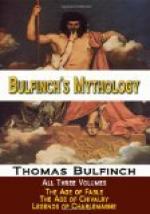This was enough to animate Tristram in the search. He had not wandered far before he encountered a knight of Arthur’s court, who proved to be Sir Kay the Seneschal, who demanded of him whence he came. Tristram answering, “From Cornwall,” Sir Kay did not let slip the opportunity of a joke at the expense of the Cornish knight. Tristram chose to leave him in his error, and even confirmed him in it; for meeting some other knights Tristram declined to just with them. They spent the night together at an abbey, where Tristram submitted patiently to all their jokes. The Seneschal gave the word to his companions that they should set out early next day, and intercept the Cornish knight on his way, and enjoy the amusement of seeing his fright when they should insist on running a tilt with him. Tristram next morning found himself alone; he put on his armor, and set out to continue his quest. He soon saw before him the Seneschal and the three knights, who barred the way, and insisted on a just. Tristram excused himself a long time; at last he reluctantly took his stand. He encountered them, one after the other, and overthrew them all four, man and horse, and then rode off, bidding them not to forget their friend the knight of Cornwall.
Tristram had not ridden far when he met a damsel, who cried out, “Ah, my lord! hasten forward, and prevent a horrid treason!” Tristram flew to her assistance, and soon reached a spot where he beheld a knight, whom three others had borne to the ground, and were unlacing his helmet in order to cut off his head.
Tristram flew to the rescue, and slew with one stroke of his lance one of the assailants. The knight, recovering his feet, sacrificed another to his vengeance, and the third made his escape. The rescued knight then raised the visor of his helmet, and a long white beard fell down upon his breast. The majesty and venerable air of this knight made Tristram suspect that it was none other than Arthur himself, and the prince confirmed his conjecture. Tristram would have knelt before him, but Arthur received him in his arms, and inquired his name and country; but Tristram declined to disclose them, on the plea that he was now on a quest requiring secrecy. At this moment the damsel who had brought Tristram to the rescue darted forward, and, seizing the king’s hand, drew from his finger a ring, the gift of the fairy, and by that act dissolved the enchantment. Arthur, having recovered his reason and his memory, offered to Tristram to attach him to his court, and to confer honors and dignities upon him; but Tristram declined all, and only consented to accompany him till he should see him safe in the hands of his knights. Soon after, Hector de Marys rode up, and saluted the king, who on his part introduced him to Tristram as one of the bravest of his knights. Tristram took leave of the king and his faithful follower, and continued his quest.




